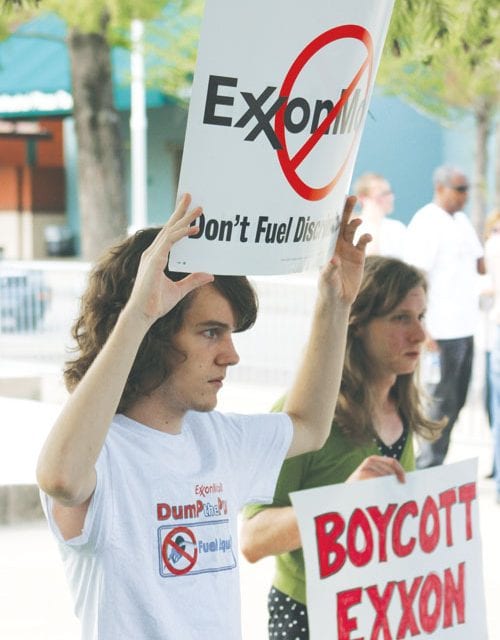 Companies doing business with the federal government must amend EEO policies
Companies doing business with the federal government must amend EEO policies
A new rule affecting companies that do business with the federal government may finally force ExxonMobil to add gender identity and sexual orientation into its Equal Employment Opportunity policy.
The Office of Federal Contract Compliance finalized rules this week banning federal contractors from discriminating based on sexual orientation and gender identity. The new rule allows the federal government to implement an executive order issued by President Barack Obama over the summer.
While most major corporations already have nondiscrimination policies in place, Irving-based ExxonMobil has steadfastly resisted making nondiscrimination a corporate policy by fighting shareholder resolutions and refusing to place wording in its EEO statement.
Before Exxon and Mobil merged in 1999, Mobil was one of the most progressive U.S. companies in terms of protecting LGBT employees and providing benefits for same-sex partners. After the merger with Exxon, all of those rights and benefits were removed.
Each year, shareholders have proposed adding sexual orientation and gender identity to the EEO policy. For the past several years, the New York state pension funds, which own $1.5 billion in ExxonMobil stock, have put the proposal before shareholders for a vote. Each year, the proposal has been voted down by shareholders.
One year, the company even went to court to prevent the proposal from going to shareholders for a vote. The company lost in court, but won the vote taken at the annual meeting, held each year at the Morton H. Meyerson Symphony Center in Dallas.
Exxon has argued that it doesn’t discriminate against any of its employees and this year began offering partner benefits.
On a scale of 0 to 100, Human Rights Campaign again rated Exxon a negative 25 in its Corporate Equality Index. Despite the fact that the company is once again offering benefits it took away from Mobil employees when the companies merged in 1999, there are no employment protections in place for LGBT workers. HRC said that because of that gap in protections, an employee could apply for benefits but then be fired after outing himself.
While ExxonMobil has no employment protections in place, the company has rarely been accused of employment discrimination. Last year, however, the national workplace discrimination organization Freedom to Work filed a suit against the company in Illinois.
According to Freedom to Work President Tico Almeida, Freedom to Work used a paired testing method that is a longstanding practice civil rights organizations use to root out illegal discrimination in employment and housing.
Two test resumes were submitted for a position with the company. One was an LGBT applicant who was highly qualified for the position. Another was a less-qualified straight woman.
Exxon responded by treating the better-qualified LGBT applicant far worse than the less qualified non-LGBT applicant.
On three occasions, Exxon contacted the less-qualified, non-LGBT candidate for an interview, and Exxon even suggested that it would hold open the job for that person. The better-qualified LGBT candidate was never contacted by Exxon about the position.
“While our litigation against Exxon is currently before the Illinois Human Rights Department, the oil giant’s failure to change their policies opens them up to new legal complaints based on President Obama’s latest executive order,” Almeida said in a written statement. “As we look to settle our case, we call on Labor Secretary Tom Perez to help ensure that ExxonMobil adequately amends its Standards of Business Conduct and does away with its notorious and offensive anti-LGBT workplace policies and practices.”
Pride at Work Executive Director Jerame Davis welcomed the change to federal contractor employment policy but said the “rule is not a silver bullet.”
“Every day, LGBT workers face untold difficulties in the workplace,” Davis said in a statement. “From taunts and harassment to being denied promotions and being fired, LGBT employees are regular targets on the job and in the hiring process.”
Although some workers in every state will now be covered by workplace protections, the rule still doesn’t cover all workers.
The new rules only cover workers in companies that do business with the federal government. Other gay and lesbian employees remain without protection in 29 states, and transgender employees are vulnerable in 32 states. The new rule applies to federal contractors who hold contract entered into or modified on or after April 8.
This article appeared in the Dallas Voice print edition December 12, 2014


